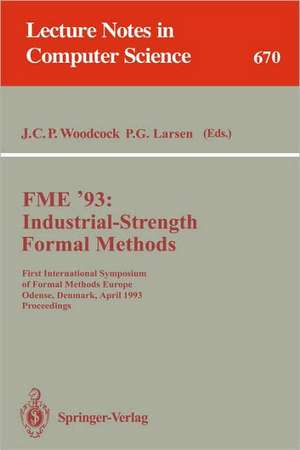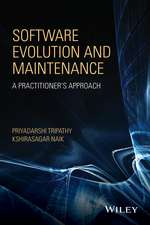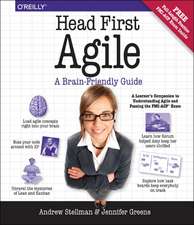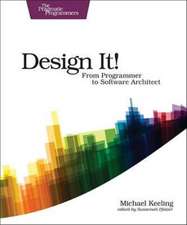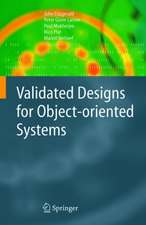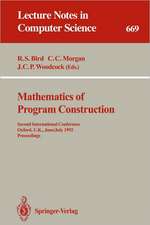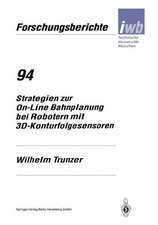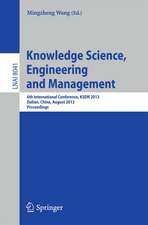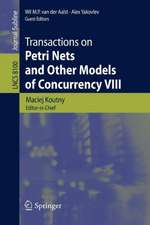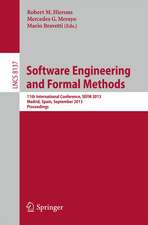FME '93: Industrial-Strength Formal Methods: First International Symposium of Formal Methods Europe, Odense, Denmark, April 19-23, 1993. Proceedings: Lecture Notes in Computer Science, cartea 670
Editat de James C.P. Woodcock, Peter G. Larsenen Limba Engleză Paperback – 6 apr 1993
Din seria Lecture Notes in Computer Science
- 20%
 Preț: 1061.55 lei
Preț: 1061.55 lei - 20%
 Preț: 307.71 lei
Preț: 307.71 lei - 20%
 Preț: 438.69 lei
Preț: 438.69 lei - 20%
 Preț: 579.30 lei
Preț: 579.30 lei -
 Preț: 410.88 lei
Preț: 410.88 lei - 17%
 Preț: 427.22 lei
Preț: 427.22 lei - 20%
 Preț: 596.46 lei
Preț: 596.46 lei - 15%
 Preț: 448.04 lei
Preț: 448.04 lei - 20%
 Preț: 353.50 lei
Preț: 353.50 lei -
 Preț: 389.49 lei
Preț: 389.49 lei - 20%
 Preț: 309.90 lei
Preț: 309.90 lei - 20%
 Preț: 645.28 lei
Preț: 645.28 lei - 20%
 Preț: 763.23 lei
Preț: 763.23 lei - 15%
 Preț: 580.46 lei
Preț: 580.46 lei - 20%
 Preț: 310.28 lei
Preț: 310.28 lei - 20%
 Preț: 655.02 lei
Preț: 655.02 lei - 20%
 Preț: 1183.14 lei
Preț: 1183.14 lei - 20%
 Preț: 340.32 lei
Preț: 340.32 lei -
 Preț: 449.57 lei
Preț: 449.57 lei - 20%
 Preț: 591.51 lei
Preț: 591.51 lei - 18%
 Preț: 938.83 lei
Preț: 938.83 lei - 20%
 Preț: 337.00 lei
Preț: 337.00 lei - 20%
 Preț: 649.50 lei
Preț: 649.50 lei - 20%
 Preț: 607.40 lei
Preț: 607.40 lei - 20%
 Preț: 1414.79 lei
Preț: 1414.79 lei - 20%
 Preț: 1024.44 lei
Preț: 1024.44 lei - 20%
 Preț: 583.40 lei
Preț: 583.40 lei - 20%
 Preț: 453.32 lei
Preț: 453.32 lei - 20%
 Preț: 575.49 lei
Preț: 575.49 lei - 20%
 Preț: 1075.26 lei
Preț: 1075.26 lei - 20%
 Preț: 585.88 lei
Preț: 585.88 lei - 20%
 Preț: 825.93 lei
Preț: 825.93 lei - 17%
 Preț: 360.20 lei
Preț: 360.20 lei - 20%
 Preț: 763.23 lei
Preț: 763.23 lei - 20%
 Preț: 340.32 lei
Preț: 340.32 lei - 20%
 Preț: 504.58 lei
Preț: 504.58 lei - 20%
 Preț: 369.13 lei
Preț: 369.13 lei - 20%
 Preț: 580.93 lei
Preț: 580.93 lei - 20%
 Preț: 343.62 lei
Preț: 343.62 lei - 20%
 Preț: 350.21 lei
Preț: 350.21 lei - 20%
 Preț: 583.40 lei
Preț: 583.40 lei - 20%
 Preț: 583.40 lei
Preț: 583.40 lei - 15%
 Preț: 438.59 lei
Preț: 438.59 lei - 20%
 Preț: 341.95 lei
Preț: 341.95 lei - 20%
 Preț: 238.01 lei
Preț: 238.01 lei - 20%
 Preț: 538.30 lei
Preț: 538.30 lei
Preț: 665.93 lei
Preț vechi: 832.42 lei
-20% Nou
Puncte Express: 999
Preț estimativ în valută:
127.44€ • 138.38$ • 107.05£
127.44€ • 138.38$ • 107.05£
Carte tipărită la comandă
Livrare economică 22 aprilie-06 mai
Preluare comenzi: 021 569.72.76
Specificații
ISBN-13: 9783540566625
ISBN-10: 3540566627
Pagini: 708
Ilustrații: XIII, 695 p.
Dimensiuni: 155 x 233 x 37 mm
Greutate: 0.98 kg
Ediția:1993
Editura: Springer Berlin, Heidelberg
Colecția Springer
Seria Lecture Notes in Computer Science
Locul publicării:Berlin, Heidelberg, Germany
ISBN-10: 3540566627
Pagini: 708
Ilustrații: XIII, 695 p.
Dimensiuni: 155 x 233 x 37 mm
Greutate: 0.98 kg
Ediția:1993
Editura: Springer Berlin, Heidelberg
Colecția Springer
Seria Lecture Notes in Computer Science
Locul publicării:Berlin, Heidelberg, Germany
Public țintă
ResearchCuprins
Reasoning about interference in an object-based design method.- Using relative refinement for fault tolerance.- Specification and validation of a security policy model.- Experiences from applications of RAISE.- Role of VDM(++) in the development of a real-time tracking and tracing system.- The integration of LOTOS with an object oriented development method.- An industrial experience on LOTOS-based prototyping for switching systems design.- Towards an implementation-oriented specification of TP protocol in LOTOS.- A metalanguage for the formal requirement specification of reactive systems.- Model checking in practice.- Algorithm refinement with read and write frames.- Invariants, frames and postconditions: a comparison of the VDM and B notations.- The industrial take-up of formal methods in safety-critical and other areas: A perspective.- A proof environment for concurrent programs.- A VDM ? study of Fault-Tolerant stable storage — Towards a computer engineering mathematics.- Applications of modal logic for the specification of real-time systems.- Formal methods reality check: Industrial usage.- Automating the generation and sequencing of test cases from model-based specifications.- The parallel abstract machine: A common execution model for FDTs.- Generalizing Abadi & Lamport's method to solve a problem posed by A. Pnueli.- Real-time refinement.- Different FDT's confronted with different ODP-viewpoints of the trader.- On the derivation of executable database programs from formal specifications.- A concurrency case study using RAISE.- Specifying a safety-critical control system in Z.- An overview of the SPRINT method.- Application of composition development method for definition of SYNTHESIS information resource query language semantics.- Verification tools in thedevelopment of provably correct compilers.- Encoding $$\mathcal{W}$$ : A Logic for Z in 2OBJ.- Formal verification for fault-tolerant architectures: Some lessons learned.- Conformity clause for VDM-SL.- Process instances in LOTOS simulation.- The SAZ project: Integrating SSADM and Z.- Maintaining consistency under changes to formal specifications.- An EVES data abstraction example.- Putting advanced reachability analysis techniques together: The “ARA” tool.- Integrating SA/RT with LOTOS.- Symbolic model checking for distributed real-time systems.- Adding specification constructors to the refinement calculus.- Selling formal methods to industry.- Tool Descriptions.
